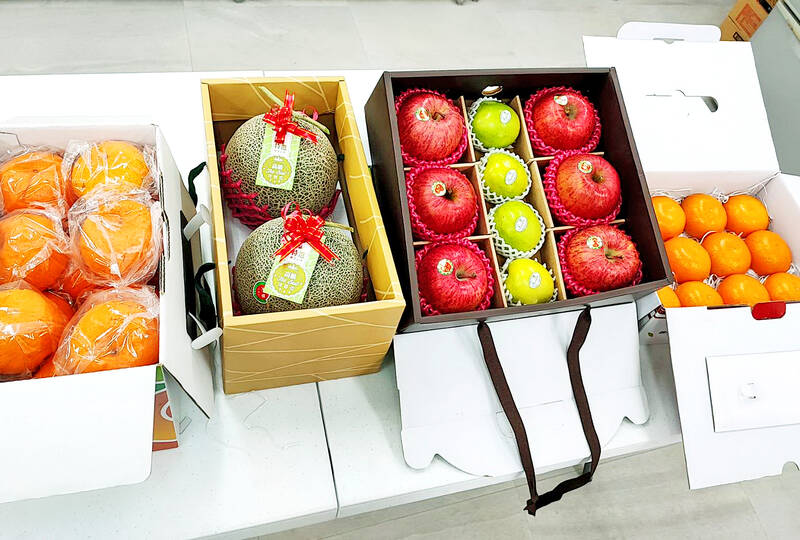Japan has replaced China as the world’s top importer of Taiwanese fruit, taking in 46.2 percent of the nation’s fruit exports, Council of Agriculture data showed.
Taiwan has over the past two years seen a shift in its target export markets, moving away from China and toward the US and Japan.
Produce exports to Japan grew by US$850 million, or 11 percent, council data showed.

Photo: Wu Chun-feng, Taipei Times
China had traditionally imported more than 80 percent of Taiwan’s produce.
To capitalize on the export shift, the council is planning new distribution methods in Japan, such as installing vending machines that sell Taiwanese fruit, a council employee said yesterday.
As most Japanese supermarkets close at 8pm, many have vending machines on their premises for people who cannot get to the store before closing time, and these venues could be opportunities for Taiwanese goods, the source said.
With China’s near-total suspension of imports of Taiwanese produce, alcohol and seafood, Taiwan is focusing more on Japan for export development.
Pineapple exports to Japan last year were valued at US$24.05 million, up 5.8 percent from 2021, while Japan imported 93 tonnes of pomeloes and other fruits from Taiwan, nearly doubling previous amounts, the council said.
Tea exports to Japan also grew to 600 tonnes, up 26 percent year-on-year, while soybean oil increased to 10,238 tonnes last year, with a value of US$15.61 million, council data showed.
The council’s International Division said it recently signed an agreement with the Japanese produce chain Wismettac Foods to annually import 3,500 tonnes of fresh pineapples, 100 tonnes of frozen pineapples and 1,500 tonnes of bananas.
Agricultural imports from the US last year reached US$4.65 billion, council data showed.
About US$1.71 billion of soybeans and other oil seeds were sourced from the US, marking a shift away from Russian supply.
Taiwan also imported US$2.1 billion worth of chicken meat from the US last year, a 31.2 percent increase from 2021, it added.

CHAOS: Iranians took to the streets playing celebratory music after reports of Khamenei’s death on Saturday, while mourners also gathered in Tehran yesterday Iranian Supreme Leader Ayatollah Ali Khamenei was killed in a major attack on Iran launched by Israel and the US, throwing the future of the Islamic republic into doubt and raising the risk of regional instability. Iranian state television and the state-run IRNA news agency announced the 86-year-old’s death early yesterday. US President Donald Trump said it gave Iranians their “greatest chance” to “take back” their country. The announcements came after a joint US and Israeli aerial bombardment that targeted Iranian military and governmental sites. Trump said the “heavy and pinpoint bombing” would continue through the week or as long

TRUST: The KMT said it respected the US’ timing and considerations, and hoped it would continue to honor its commitments to helping Taiwan bolster its defenses and deterrence US President Donald Trump is delaying a multibillion-dollar arms sale to Taiwan to ensure his visit to Beijing is successful, a New York Times report said. The weapons sales package has stalled in the US Department of State, the report said, citing US officials it did not identify. The White House has told agencies not to push forward ahead of Trump’s meeting with Chinese President Xi Jinping (習近平), it said. The two last month held a phone call to discuss trade and geopolitical flashpoints ahead of the summit. Xi raised the Taiwan issue and urged the US to handle arms sales to

BIG SPENDERS: Foreign investors bought the most Taiwan equities since 2005, signaling confidence that an AI boom would continue to benefit chipmakers Taiwan Semiconductor Manufacturing Co’s (TSMC, 台積電) market capitalization swelled to US$2 trillion for the first time following a 4.25 percent rally in its American depositary receipts (ADR) overnight, putting the world’s biggest contract chipmaker sixth on the list of the world’s biggest companies by market capitalization, just behind Amazon.com Inc. The site CompaniesMarketcap.com ranked TSMC ahead of Saudi Aramco and Meta Platforms Inc. The Taiwanese company’s ADRs on Tuesday surged to US$385.75 on the New York Stock Exchange, as strong demand for artificial intelligence (AI) applications led to chip supply constraints and boost revenue growth to record-breaking levels. Each TSMC ADR represents

Pro-democracy media tycoon Jimmy Lai’s (黎智英) fraud conviction and prison sentence were yesterday overturned by a Hong Kong court, in a surprise legal decision that comes soon after Lai was jailed for 20 years on a separate national security charge. Judges Jeremy Poon (潘兆初), Anthea Pang (彭寶琴) and Derek Pang (彭偉昌) said in the judgement that they allowed the appeal from Lai, and another defendant in the case, to proceed, as a lower court judge had “erred.” “The Court of Appeal gave them leave to appeal against their conviction, allowed their appeals, quashed the convictions and set aside the sentences,” the judges